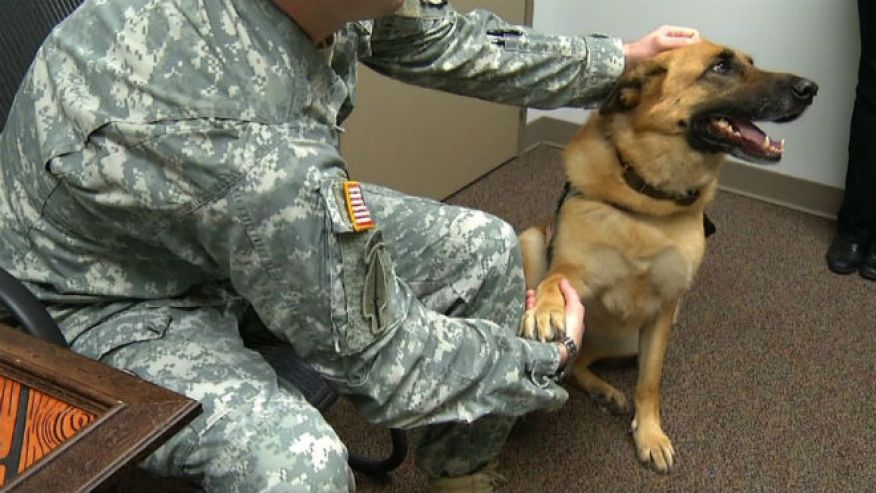Lifestyle
Therapy dog Lexy helps patients at Fort Bragg and keeps them coming back for treatment
FORT BRAGG, N.C. – After three deployments to Iraq and three to Afghanistan, Staff Sgt. Dennis Swols is agitated, prone to bouts of anger and unable to really talk about his time on the battlefield.
But as Swols sits in a small office in the Robinson Health Clinic at Fort Bragg, his hand drops to the furry head beside him and his mood brightens. Settled at his feet, Lexy, a 5-year-old German shepherd, gives Swols a few moments of distraction.
It’s her job. And, according to Swols, she’s good at it.
“I have a hard time talking to people about my deployments and everything,” says Swols, who is with the 82nd Airborne’s 4th Brigade Combat Team. After taking part in the invasion of Afghanistan in 2001 and the march into Baghdad in 2003, he’s been diagnosed with post-traumatic stress. “But having her here, I just pet Lexy. Or I’m just sitting here and we won’t talk about deployments, we’ll just (talk) about the dog. … My day is better every time I come in.”
For 82nd Airborne psychiatrist Maj. Christine Rumayor, Lexy is a partner, a conversation starter and a living, breathing medical tool that can calm a patient and make a therapy appointment a little more enjoyable.
A slowly evolving form of treatment, animal therapy is used in only a few other Army installations, including Walter Reed National Military Medical Center in Bethesda, Maryland. A small number of dogs like Lexy are being used almost as co-therapists. Others routinely work as service animals and are often used for animal-assisted therapy, including in visits to patients in the hospitals.
Lexy’s move into therapy was unexpected. Rumayor decided to put her new puppy through the training when she realized Lexy was less of a guard dog and more of a calm cuddler. So, Lexy went through about 2 1/2 years of training before she was able to pin on her rank – she’s a lieutenant colonel – and become certified as Fort Bragg’s only therapy dog.
As the Army struggles to address the broad swath of stress disorders and mental health problems brought on by more than a decade of war, one of the biggest hurdles is getting soldiers to put aside the bravado and seek treatment. Lexy, it turns out, is particularly good at that.
Van Woodruff, who was a sergeant first class, went to his scheduled appointment just a few days before he was set to get his medical retirement and move out of the Army after 13 years in the service.
“It’s hard for me to come to these appointments. I can’t really sit in the waiting room,” said Woodruff, who suffers from obsessive-compulsive disorder. “I don’t look forward to this whole process of being here. … The whole process of being here is something that’s agitative to my diagnosis.”
But on a sunny Wednesday morning, the Alabama native is sitting in Rumayer’s office. “This is the only one I look forward to going to because of Lexy. I love dogs.”
Rumayor, who wrote the Fort Bragg policy that allows her to use Lexy in her practice, said there was resistance at first.
“You don’t want everybody to think they can just bring their dog to work,” she said.
Rumayor also has seen what an asset the dog can be in getting soldiers to seek out therapy and consistently attend their appointments.
Walking around the base, she uses Lexy as a lightning rod to attract soldiers, then draws them into conversation. On any given day, she and Lexy will wander over to the motor pool or anywhere troops might gather, to see who might be interested in having a chat.
“Stigma is one of the huge things the military is trying super hard to overcome – behavioural health stigma being the biggest one, I think. And Lexy is probably the biggest asset I have in overcoming that stigma,” Rumayor said. “There’s nothing better than coming to an appointment where you get to have a warm fuzzy thing that you get to pet all the time. People don’t want to come in the door. When they see her coming in, it makes them want to come in the door.”
And often the soldiers reward her.
On her vest, Lexy sports an Army Ranger tab and a spray of other badges and patches that she got from patients. The special forces tab came from a soldier who had been injured in a roadside bomb blast, and Lexy and Rumayor visited him in the hospital.
Navy Capt. Robert Koffman, the senior consultant for behavioural health at the National Intrepid Center of Excellence in Bethesda, has a therapy dog of his own, named Ron. And he’s seen the broad impact the dogs can have.
Ron, a 3-year-old golden retriever/labrador mix, holds the rank of a one-star general and his designated military occupation is a “psych tech.” He’s even trained to bring tissues to distressed patients and put his head on a person’s lap if he or she is stressed.
Lt. Col. Matthew St. Laurent, who is the occupational therapy chief at Walter Reed, said the use of dogs to aid therapy has been endorsed by U.S. Army Medical Command and appears to be getting more support across the military. Both he and Koffman said additional research is needed to determine how and when it is best to use the animals.
“It’s tough for anybody to go to their mental health provider,” said St. Laurent, who also runs the Therapeutic Service Dog Training Program. “But they need to see mental health providers and if you’re introduced to the mental health community by a fluffy, loving canine, you’d be more inclined to come to the clinic and pet the dog. And one thing leads to another, and you’re in the clinic.”






















